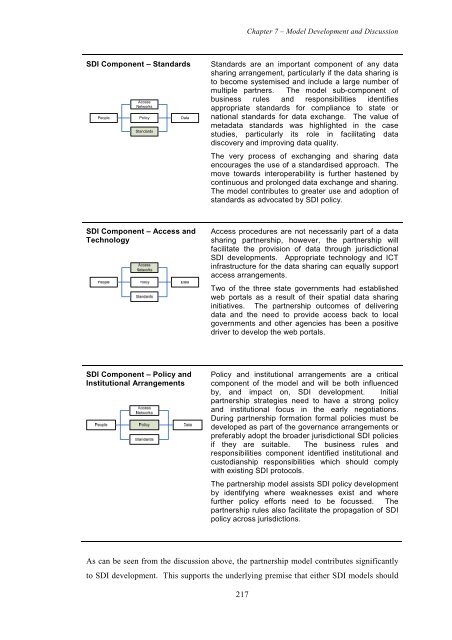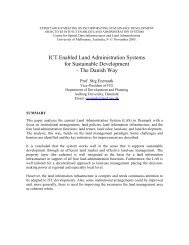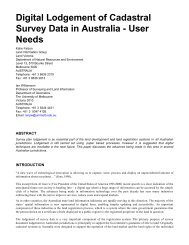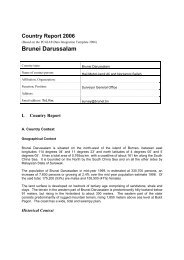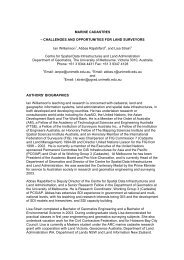A Local-State Government Spatial Data Sharing Partnership
A Local-State Government Spatial Data Sharing Partnership
A Local-State Government Spatial Data Sharing Partnership
Create successful ePaper yourself
Turn your PDF publications into a flip-book with our unique Google optimized e-Paper software.
SDI Component – Standards<br />
Access<br />
Networks<br />
People Policy<br />
<strong>Data</strong><br />
Standards<br />
SDI Component – Access and<br />
Technology<br />
SDI Component – Policy and<br />
Institutional Arrangements<br />
217<br />
Chapter 7 – Model Development and Discussion<br />
Standards are an important component of any data<br />
sharing arrangement, particularly if the data sharing is<br />
to become systemised and include a large number of<br />
multiple partners. The model sub-component of<br />
business rules and responsibilities identifies<br />
appropriate standards for compliance to state or<br />
national standards for data exchange. The value of<br />
metadata standards was highlighted in the case<br />
studies, particularly its role in facilitating data<br />
discovery and improving data quality.<br />
The very process of exchanging and sharing data<br />
encourages the use of a standardised approach. The<br />
move towards interoperability is further hastened by<br />
continuous and prolonged data exchange and sharing.<br />
The model contributes to greater use and adoption of<br />
standards as advocated by SDI policy.<br />
Access procedures are not necessarily part of a data<br />
sharing partnership, however, the partnership will<br />
facilitate the provision of data through jurisdictional<br />
SDI developments. Appropriate technology and ICT<br />
infrastructure for the data sharing can equally support<br />
access arrangements.<br />
Two of the three state governments had established<br />
web portals as a result of their spatial data sharing<br />
initiatives. The partnership outcomes of delivering<br />
data and the need to provide access back to local<br />
governments and other agencies has been a positive<br />
driver to develop the web portals.<br />
Policy and institutional arrangements are a critical<br />
component of the model and will be both influenced<br />
by, and impact on, SDI development. Initial<br />
partnership strategies need to have a strong policy<br />
and institutional focus in the early negotiations.<br />
During partnership formation formal policies must be<br />
developed as part of the governance arrangements or<br />
preferably adopt the broader jurisdictional SDI policies<br />
if they are suitable. The business rules and<br />
responsibilities component identified institutional and<br />
custodianship responsibilities which should comply<br />
with existing SDI protocols.<br />
The partnership model assists SDI policy development<br />
by identifying where weaknesses exist and where<br />
further policy efforts need to be focussed. The<br />
partnership rules also facilitate the propagation of SDI<br />
policy across jurisdictions.<br />
As can be seen from the discussion above, the partnership model contributes significantly<br />
to SDI development. This supports the underlying premise that either SDI models should


